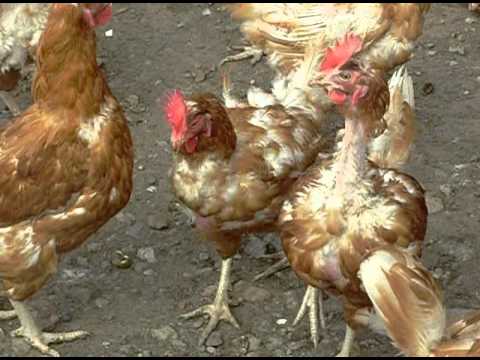

Protein deficiency: Feathers and eggs are predominantly protein. Adult chickens require diets between 15-17% protein depending on which chicken resource you rely upon. They should all be on layer feed after approximately 20 weeks of age. Sometimes, in our good intentions of sharing kitchen scraps, fruits and vegetables, chickens can become deficient in protein. Therefore, they will seek another source to make up for this deficiency, even if this includes eating feathers.
Boredom/Lack of Adequate Space: Chickens can become bored, especially in the winter. It is very important to provide your chickens with the proper amount of spacing per bird. In flocks that are not allowed to free-range, it is suggested that each standard size chicken has approximately 10 square feet of space. Bantams of course require less. It is also important to provide them with distractions to keep them happy and occupied during these times when the grass outside is not always greener.
Mites/Fleas: Sometimes missing feathers are the only signs of mites. Mites are incredibly elusive. They like to hide in the nooks and crannies of the coop and come out and feed on the chickens under the cover of darkness. They suck the chicken’s blood and in the morning, return to their hiding place. It is not uncommon for chicken keepers only to find them on their hens after they investigate with a flashlight in the evening. Mites that crawl and move across the chicken’s skin are not only irritating, but also cause itching and pain after a while. This annoyance can lead to chickens pecking at these sensitive spots.
Lice: Like mites, lice can be just as annoying for the same reasons; however, they love to congregate at the base of the feathers where the feathers meet the skin. They can cause itching and a burning sensations. Lice love to hang out best near the vent, under the wings and on the head. They will not leave their host. Instead they rapidly multiply leaving your chicken defenseless, except for feather pecking.
Bully hen/pecking order: Yes, even in the world of chickens there are bullies.
Chickens Instinctively Peck: Chickens most always peck first at things that catch their eye. They peck at shiny things such as buttons, earrings and painted toenails. They peck at bugs, slugs and small moving flies. Their curiosity is expressed via pecking. There are a few things that you must remember. Chickens love the color red. Chickens love to peck at red things including blood. Chickens can become cannibals if left to their own devices.
Vent Gleet: Vent gleet is also known as a fungal infection of the gastrointestinal tract. It can lead to feather loss around the vent and the entire backside of your chickens. It is most commonly seen in hens. You can read more about it here.
Worms: If the worm infestation is serious enough in your flock the chickens will find the worms irritating to the vent area. Thus, your chickens will peck at their vents to try and address the irritation and also perhaps at other affected chickens’ vents too, especially if they notice the worms. Read more about the types of worms that affect chickens here and how to treat for them. Any veterinarian can check your chickens’ poop for evidence of worms even if they don’t treat chickens.
 Contact Jaguza Support
Contact Jaguza Support